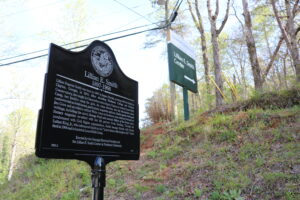SAVANNAH, GA, April 21, 2022 – The Georgia Historical Society (GHS), in conjunction with the Lillian E. Smith Center at Piedmont University, unveiled a new Georgia Civil Rights Trail historical marker recognizing Lillian Eugenia Smith in Clayton, Georgia, on Wednesday, April 20, 2022.
Lillian E. Smith was a writer and supporter of the Civil Rights Movement who spoke out against segregation, racism, and white supremacy. She openly challenged Jim Crow laws and acted as a critical White voice on Southern race relations through her writing, publication of literary magazines with her life partner, Paula Snelling, and her work at Laurel Falls Camp for Girls. In addition to promoting open discussions with young campers at Laurel Falls Camp, Smith also invited Black and White women to the camp for conversations regarding social issues faced by women, such as gender roles, segregation, and understanding international relations. She was also the author of multiple books, including Strange Fruit (1944) and Killers of the Dream (1949).
“Thinking back to my education, I never heard about Lillian Smith and her activism to create a more equitable society for all,” said Matthew Teutsch, Ph.D., Director of the Lillian E. Smith Center. “This historical marker, on the land where she lived and worked, and where so many Civil Rights activists visited, serves as a way to educate and inform others about her lasting impact.”
Lillian E. Smith’s father opened Laurel Falls Camp in 1920, and Smith took over its operations in 1925. The camp closed its doors in 1948, and when Smith died she was buried on the former camp’s grounds.
“The Lillian E. Smith historical marker joins over 50 historical markers across the state highlighting the struggle for human and civil rights in Georgia,” said GHS Marker Manager Elyse Butler. “Lillian E. Smith was a prolific writer, discussing and publishing controversial views on women’s rights and civil rights during a period when White women did not discuss these topics in public.”
Speakers at the dedication included Matthew Teutsch, Ph.D., Director of the Lillian E. Smith Center, who also made remarks on behalf of author and historian Keri Leigh Merritt, Ph.D.; Kurt Cannon, Mayor of Clayton, Georgia; Rev. Tim Garvin-Leighton, Piedmont University Campus Minister; and Elyse Butler, Georgia Historical Society Marker Manager; with performances from the Haystack Choir and Catherine Gunn.
The Georgia Historical Society’s Georgia Civil Rights Trail initiative focuses broadly on the economic, social, political, and cultural history of the Civil Rights Movement. Specifically, roadside historical markers tell the story of the Movement in Georgia by guiding audiences to the sites where history happened, inviting them to stand on the ground where struggles and events took place, and providing a foundation upon which to build and cultivate a deeper understanding of the past and its relevance to the present. The Georgia Civil Rights Trail highlights significant events from communities around the state to illustrate the overarching themes of education, leadership, massive resistance, white backlash, desegregation, and voting rights.
For more information about Lillian E. Smith historical marker dedication or the Georgia Historical Society marker program, please contact Keith Strigaro, Director of Communications, at 912.651.2125, ext. 153 or by email at kstrigaro@georgiahistory.com.
The marker reads as follows:
Lillian E. Smith
1897-1966
Lillian Eugenia Smith was born in 1897 in Jasper, Florida, moving with her family to Clayton, Georgia, in 1915. After attending Piedmont College and Peabody Conservatory, she taught in China before returning to Clayton to work at Laurel Falls Camp, her family’s camp for girls. As camp director, she led discussions about controversial societal issues, particularly on gender and race. Smith openly challenged Jim Crow and provided a critical White voice on Southern race relations through her writings, including the novel Strange Fruit and memoir Killers of the Dream, and a literary magazine co-edited with her life partner Paula Snelling. Through her involvement with Civil Rights organizations, Smith became friends with Martin Luther King, Jr., who referenced Smith in his “Letter from a Birmingham Jail.” Smith died in 1966 and is buried at Laurel Falls Camp.
Erected by the Georgia Historical Society and
the Lillian E. Smith Center at Piedmont University
###
ABOUT THE GEORGIA HISTORICAL MARKER PROGRAM
The Georgia Historical Society (GHS) administers Georgia’s historical marker program. For almost 25 years, GHS has erected nearly 300 new historical markers across the state on a wide variety of subjects. GHS also coordinates the maintenance for more than 2,200 markers installed by the State of Georgia prior to 1998. Online mapping tools allow users to design driving routes based on historical markers, and a mobile app helps visitors locate and learn about markers nearby. Visit georgiahistory.com for more ways to use Georgia’s historical markers and experience history where it happened.
ABOUT THE GEORGIA HISTORICAL SOCIETY
Georgia Historical Society (GHS) is the premier independent statewide institution responsible for collecting, examining, and teaching Georgia history. GHS houses the oldest and most distinguished collection of materials related exclusively to Georgia history in the nation.
To learn more visit georgiahistory.com.

